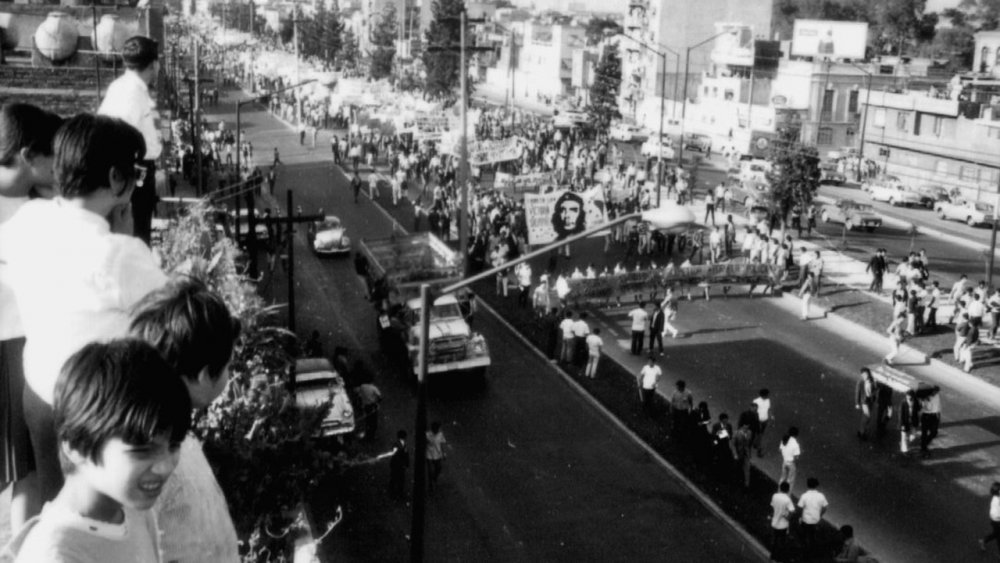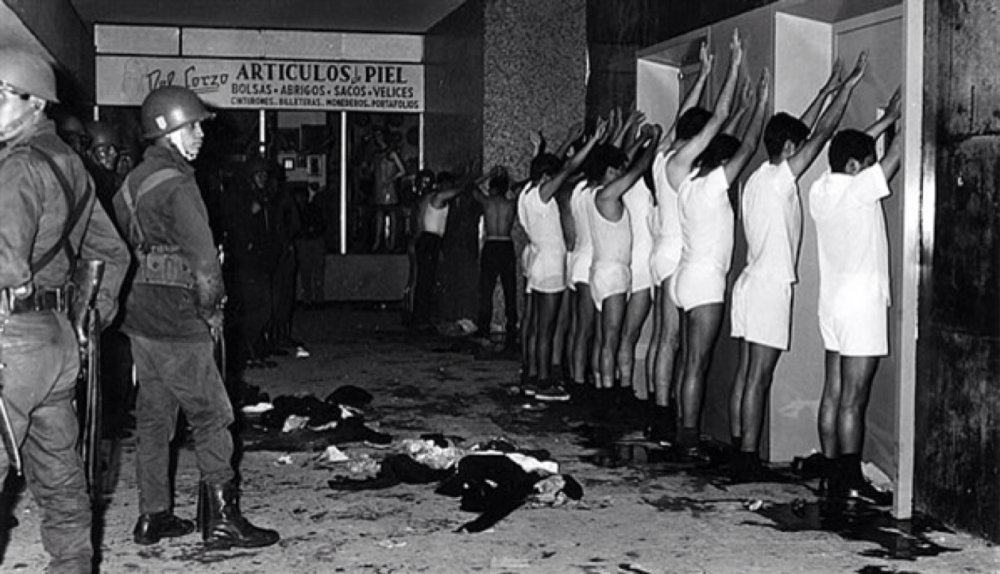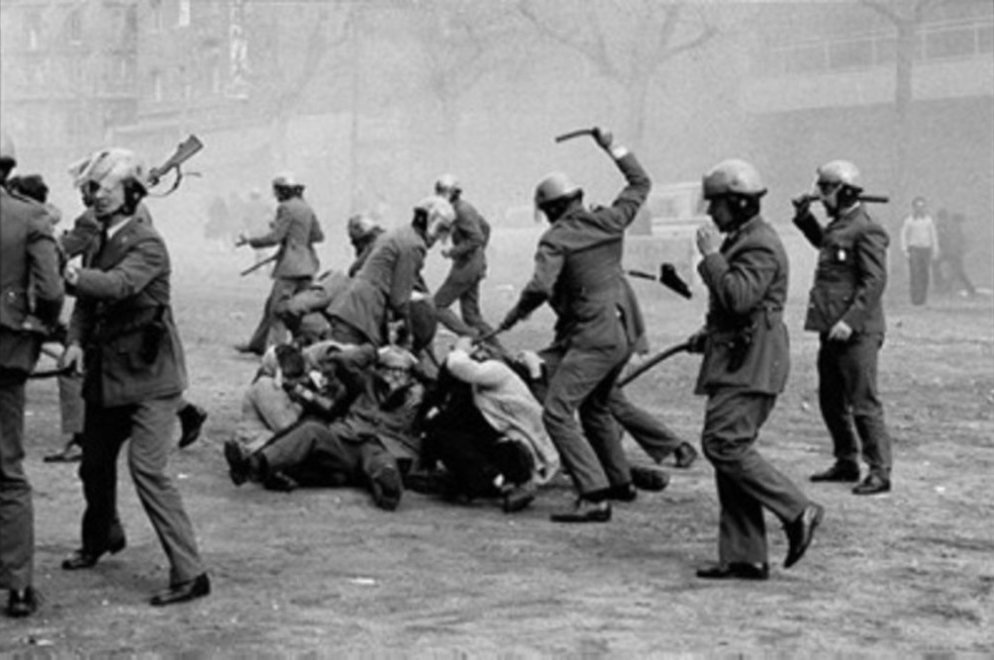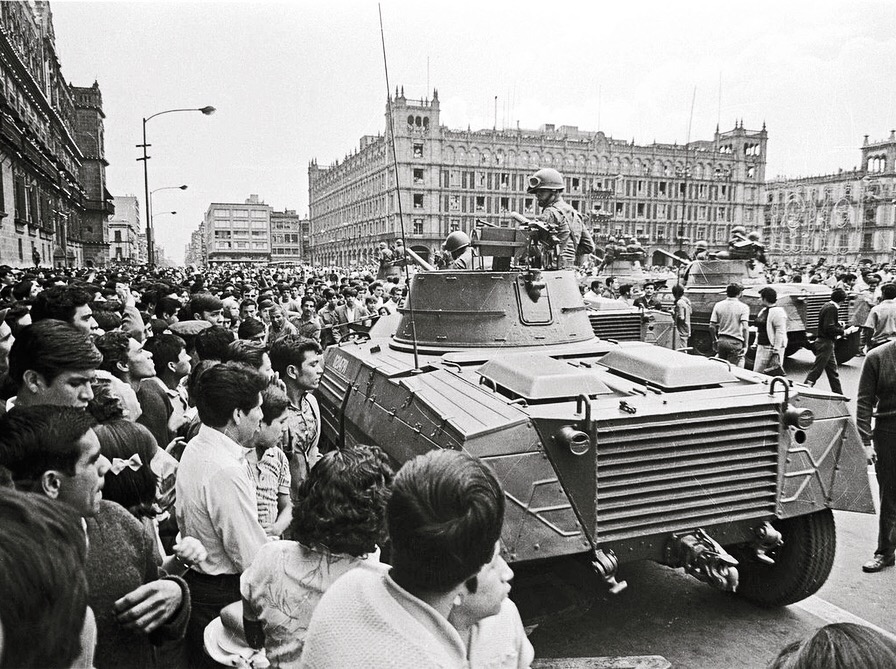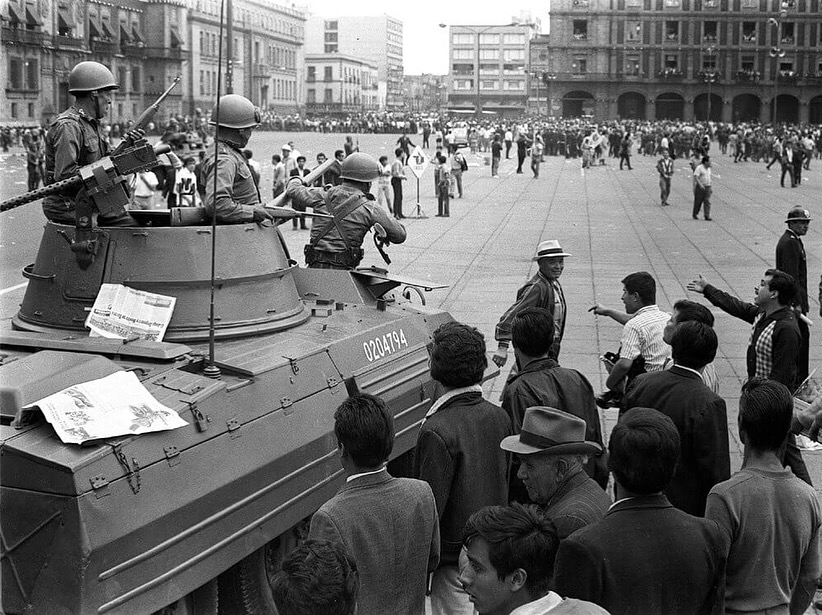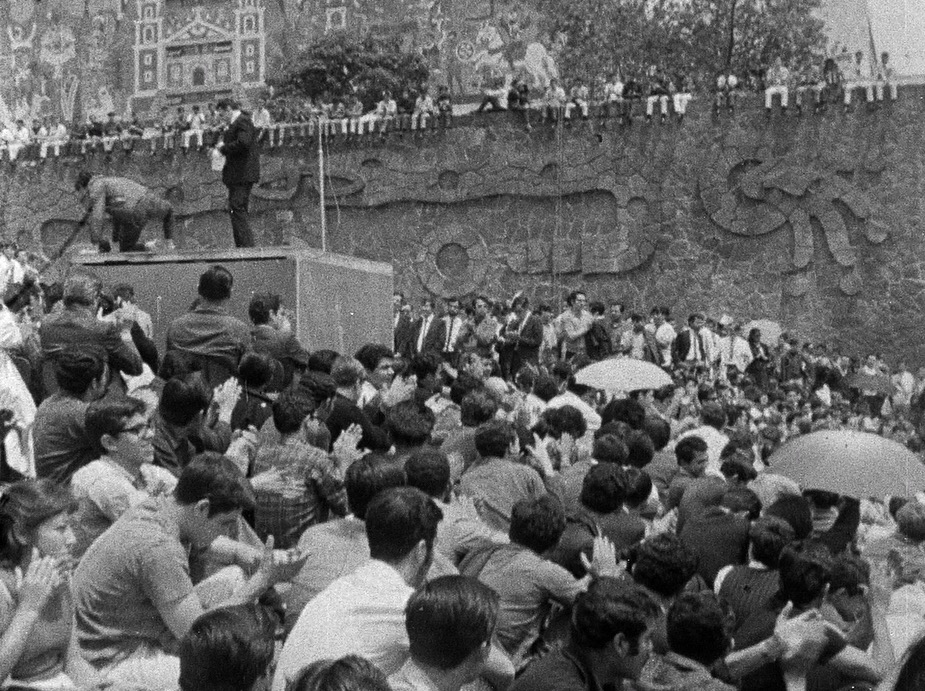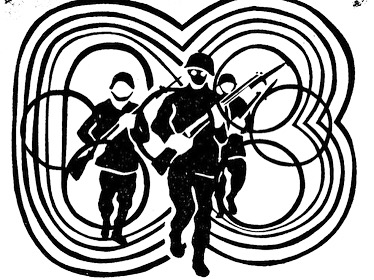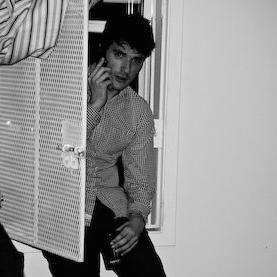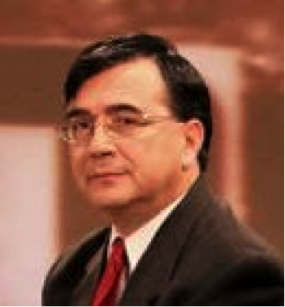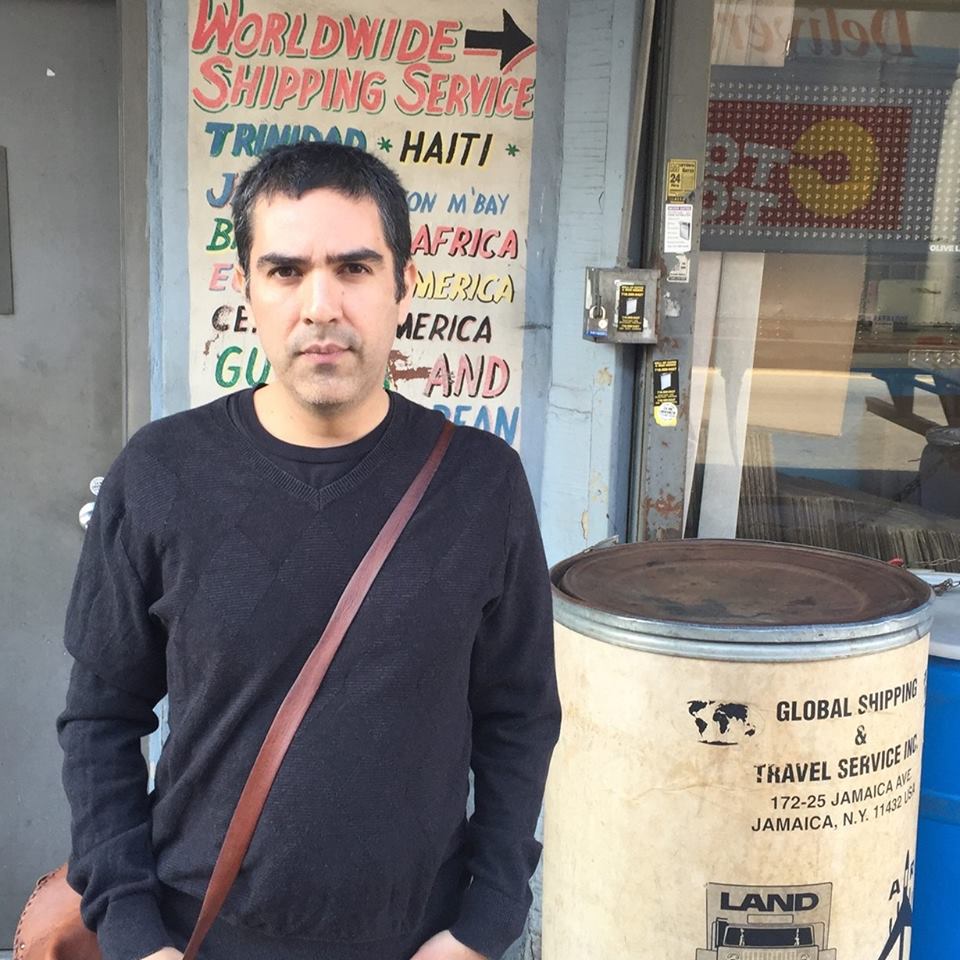Nov 8, 2018 at 7:30 pm
Frozen Revolutions: El Grito
Conversation following the screening with Steve Macfarlane. Co-presented with Cinema Tropical and National Autonomous University of Mexico.
As part of Frozen Revolutions, a series that revisits the documentation of social movements from the year 1968, we turn to the Olympics. To American eyes, the defining image of the Mexico City Olympics is probably John Dominis’ photograph of Gold and Bronze Medal winners Tommie Smith and John Carlos standing at the world’s attention, their fists raised from the podium. Yet for Mexicans it’s impossible to acknowledge the 1968 Summer Olympics without the Tlatelolco Massacre just days before the games began, wherein a squabble between graffitists and cops escalated into a massive confrontation between student activists and the Mexican military.
Small-scale protests, initially sparked by a feud between vocational schools in Mexico City, escalated into multiple weeks of nonviolent occupation: students and faculty alike from the National Autonomous University of Mexico (UNAM) were unified in their protests against the repressive regime of then-president Díaz Ordaz. Specifically, the student and his ruling Institutional Revolutionary Party (PRI), widely seen as corrupt for its accommodation of United States military and financial support ahead of the Games. The students issued statements alleging that the myth of Mexico as “a model for other underdeveloped countries to follow has been destroyed by the government forces themselves.”
A cluster of students armed with 16mm cameras began to capture the unfolding action in the streets, including a 24 year old film student named Leobardo López Arretche. Although its shooting was an open-ended and collaborative effort, López took control of the editing process to shape what would become the finished film: EL GRITO (THE SCREAM). It tracks the escalation of the rallies into a full-bore standoff between demonstrators and anti-riot granderos, allegedly paid in cash per arrest, who put down an occupation of the nearby National Politechnical Institute. While the protests had grown to include all sections of progressive society (including middle-class citydwellers, labor activists, neighbors, faculty and students alike) in the Plaza de las Tres Culturas, the military ended up surrounding the protests in a “pincer movement” on October 2nd, opening fire with Ordaz’ permission. In the end, over 1300 people were arrested, and 400 protesters were killed.
Beyond the ensuing nationwide scandal, Tlatelolco is a critical event in public memory in Mexico – but was not depicted onscreen for over 20 years until Jorge Fons’ dramatization ROJO AMANCER in 1991. EL GRITO is the only feature-length work credited to López, who committed suicide two years later. (Also of interest is the contribution of journalist Oriana Fallaci, then covering the student movement, as “screenwriter”.) The film is considered the only primary-source documentary about the massacre, equal parts riveting tactical journalism and a bleak indictment of the repression undertaken by the PRI (whose control of Mexico’s government went uninterrupted from 1929 to 2000.) After decades spent as a suppressed, secret film, UNAM is now distributing it in a clean digital restoration. This will be the first screening of the film in the United States and the New York City premiere, fresh off a screening at the 2018 Viennale.
Program
El Grito
Leobardo López Aretche, 120 mins, 1968
A documentary on the 1968 student movement in Mexico created by the students themselves.
120 min
Steve Macfarlane is a writer and filmmaker from Seattle, Washington. A programmer at Spectacle in Williamsburg, his writing has appeared in Cinema Scope, The White Review, Filmmaker Magazine, and the Brooklyn Rail, among others.
Historian of contemporary Mexico City and the problems of cultural change associated with urbanization. Research professor at the Historical Studies Center of the Colegio de México. Among his recent publications stand out Political history of the city of Mexico (from its foundation to the year 2000) , coordinated by him (El Colegio de México, 2012). History of the restlessness. The revolution in Mexico City, 1911-1922 (El Colegio de México, 2010) and in collaboration with Carlos Lira Mexican cities of the twentieth century. Seven historical studies ” (UAM / Colmex / Conacyt, 2009).
He has taught courses in various universities in the country, such as the Michoacán University of San Nicolas de Hidalgo, the Mora Institute, the Autonomous Metropolitan University, the Political Science Faculty of the UNAM, the Universidad Iberoamericana and the ITAM, among others; He was a visiting professor at the University of California at San Diego. In 2010 he received the Medal of Cultural Merit “Carlos Monsiváis” in recognition of his academic career. It has also been awarded by the Mexican Committee of Historical Sciences in reference to the best review and the best article, published in 2005 and 2003, respectively. He has directed about twenty doctoral theses and has collaborated in various editorial committees of prestigious journals. He is currently preparing a book whose provisional title is Museum of the universe. Political history of the 1968 Olympic Games.
Fran Ilich, artist and writer based in New York City, is the author of 3 award-winning novels, a book-length essay and multiple works of narrative media. He was a fellow at Eyebeam and A Blade of Grass. He has produced work by comission of the New School’s Vera List Center for Art and Politics, No Longer Empty and others. He was Visiting Lecturer at the Literature Department of the University of California San Diego and director of the Literature Department at Centro Cultural Tijuana. He participated in Berlinale Talent Campus, Transmediale, ARCO, Documenta 12 and 13, EZLN’s Festival Mundial de la Digna Rabia. Has shown at the Walker Art Center, Creative Time’s Living as Form, Instituto de Arte Gráfico de Oaxaca, and other venues in The Americas, Asia and Europe. Aridoamérica Winter Plan was a solo show commisioned by ISCP at El Museo de Los Sures in Brooklyn.
Frozen Revolutions
It’s no secret that protest rippled around the globe in 1968, a year equally marked in the bourgeois memory by political upheaval and widespread paranoia. After five decades of tectonic capital shocks and never-ending privatization, we’re experiencing another cascade of unrest – but what if it’s really the same one? FROZEN REVOLUTIONS, a series co-organized with critic and programmer Steve Macfarlane, looks to the archive to reexamine images and stories produced in the heat of this worldwide social movement beyond the broad strokes of “official history”. These documents of dissent ask us to assess the impact of their collective movements, foregrounding the challenge of looking directly into the extinguished promises (and lingering romanticisms) in their wake.
Presented With

National Autonomous University of Mexico




